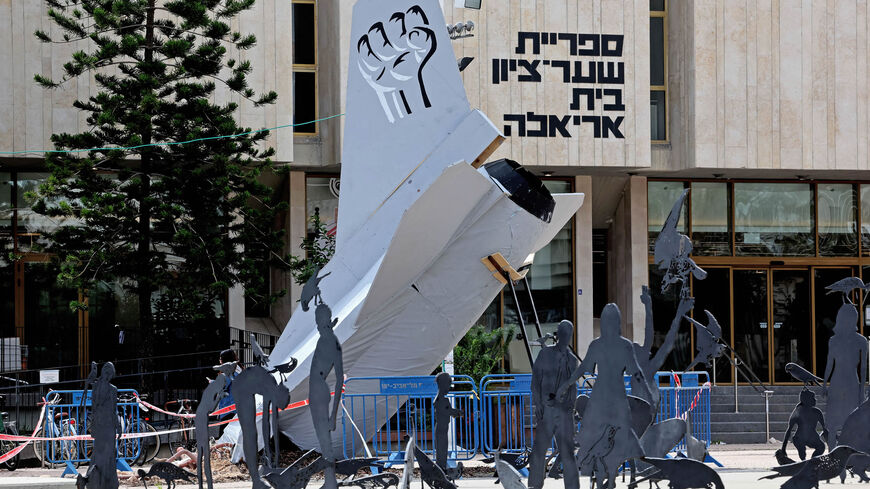TEL AVIV — The legislation approved this week neutering the Supreme Court’s review of government decisions, and the widespread protest movement that preceded Monday’s vote, are expected to have a negative impact on the Israel Defense Forces (IDF).
While the extent of the ramification is unknown as yet, several thousand reservists have already announced they are suspending their service to protest what they see as the government’s drift toward a dictatorship. According to the "Brothers in Arms" protest group last week, some 20,000 reservists from all branches of the army had signed on to an open letter, warning that they will not show up for service if the judicial overhaul is adopted. However, it is difficult to estimate if the number is correct.
For obvious reasons, the IDF has not published exact figures of those rejecting reserve duty call-ups. Members of the government’s security Cabinet also say they have not been given comprehensive information by the military officers who briefed some of them in recent days.
Air Force biggest concern
Clearly, the source of greatest concern is the publicly announced refusal of over 830 Israel Air Force personnel, including 260 pilots, to show up for voluntary reserve service. These 830 individuals have informed their commanders of their decision. According to Haaretz, 1,140 air force personnel had signed on to an open letter, stating they will not show up for reserve duty over the judicial overhaul. The air force fears that its preparedness may be undermined if pilots do not conduct the requisite number of monthly flights to retain operational combat fitness and readiness.
Senior IDF officials note that the operational capability that has been built up over many years does not dissipate at once, but various assessments foresee a gradual deterioration and loss of competence in various units.
The top IDF brass is also greatly troubled by the penetration of the deeply divisive public discourse into the ranks of the military, which has always been careful to keep politics out of the army. Increasing arguments have emerged in recent weeks between officers and soldiers opposed to the judicial overhaul and those who support it, and senior officers say they are often unable to stop them.
IDF Chief Lt. Gen. Herzi Halevi has instructed unit commanders to hold talks with all soldiers — those performing mandatory service, career army officers and reservists — in a bid to control the damage. Halevi also met with Prime Minister Benjamin Netanyahu following Monday’s Knesset vote and asked him to instruct members of his government and Knesset coalition to refrain from publicly denigrating the pilots and other reservists and casting aspersions on their loyalty to the state.
According to senior IDF officials, even if the readiness is intact, cohesion has been undermined in some units, affecting their operational capabilities. Thus, for example, the decision of pilots to suspend their volunteer reserve duty has been met with anger by members of some technical crews who support the legal reform led by the government — a disturbing trend given the vital teamwork between pilots and technical crews who inspect and equip the aircraft.
Career and conscripts
The IDF is also concerned about the spillover of protests into the ranks of the career army and the conscripts required to serve two or three years in the army. Unlike reservists, officers on mandatory military service and those in the career military are unlikely to openly express their objections to the government’s moves. But some may decide not to extend their service, decline to undergo officers’ training or leave the career army in protest, risking long-term damage. The units most at risk of such quiet protest moves are aircrews, military intelligence personnel and the technological units of the IDF.
The IDF is no less concerned about the upcoming recruitment cycle, after mothers of recruits have formed social media groups in recent days to express their refusal to have their sons and daughters serve in combat units or serve at all under the command of the current government.
The commander of the Operations Division of the General Staff, who monitors data regarding the IDF's competence and unit cohesion, has been presenting daily reports to Halevi, who conveys them to Defense Minister Yoav Galant and, as necessary, to Netanyahu.
The army's intelligence branch has issued warnings in recent weeks pointing out that Israel's enemies — especially the Iranian leadership and Hezbollah Secretary-General Hassan Nasrallah — are watching the internal rift in Israel with glee. Nasrallah gloated this week that Israeli society is crumbling, and members of his Shiite terror organization have been mounting repeated provocations against Israeli forces along the Israeli-Lebanese border.
Defense Minister Yoav Gallant, as well as the army's top brass, are confident that if war breaks out, all the reservists who have declared they are suspending their service will show up for duty in droves, though their readiness and competence may be damaged. Still, senior officers estimate that the damage caused to the IDF in recent months could take years to fix.








